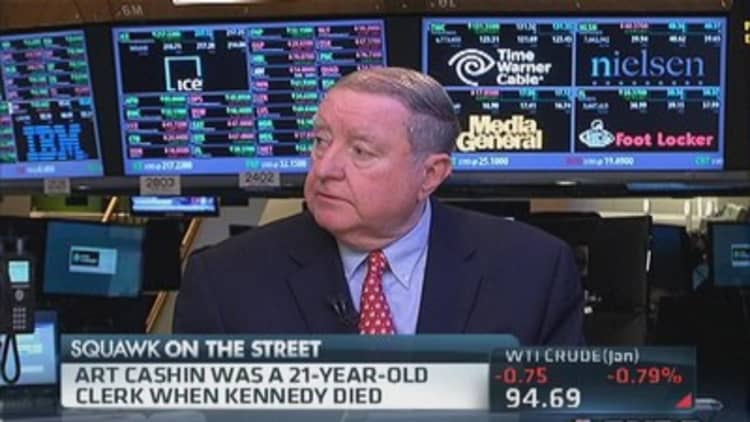
Art Cashin was only a few years into what would become a legendary career on Wall Street when John F. Kennedy was shot in Dallas.
Like virtually every American who was around then, he remembers where he was when he got the news.
More than that, though, he recalls the market impact before anyone even knew what was going on. Wall Street was in sell mode before it became clear what had happened that fateful day, according to a remembrance Cashin shared with clients Friday morning.
Cashin, now director of floor operations at UBS, had started at Thomas McKinnon—now part of Prudential—in 1959. The 1963 assassination happened a year before he would go on to become a member of the New York Stock Exchange and a partner at P.R. Herzig.
On the floor of the NYSE selling had begun before any headlines hit the tape. Months later I learned that was thanks to a savvy branch manager in Dallas.
The manager of whom Cashin spoke figured it would be a slow day in the city due to the Kennedy motorcade that was expected to pass through. Consequently, he decided to let most of this staff go watch the parade, keeping only a skeleton crew around the office.
But when the crew returned after hearing the event was canceled—without knowing why—the manager grew concerned, according to Cashin's knowledge of the story:
After questioning, he learned that they had heard the sirens accelerate, the police lights flare and the "parade" suddenly turn right. They were many blocks away and obviously heard no shots.
The savvy manager quickly asked—"Give me a bullish reason to pull a president out of a parade?" "It's not to sign a tax bill—that could wait." No one could think of a bullish reason to divert a parade. Then they mulled bearish reasons. No one thought assassination. But they did think natural disaster, nuclear accident, missile threat and scores of others. That's when they decided something "bad" must have happened and began to sell.
As their sell orders poured onto the floor and prices began to melt, they were asked by brokers—"Why the selling?" The response was the incomplete—"something about the President."
The horror of what had actually happened soon hit.
Sometime later, the first headline hit—"Shots reported fired at President's motorcade!" The selling broadened and accelerated. Rather quickly the next headline—"President reported hit."
Exchange leaders hastily gathered and discussed closing the exchange. Then the headline "Motorcade diverted to Parkland Hospital." They rang the bell at 2:07 (EST).
The Dow fell the equivalent of what would be 460 points today. When we reopened Tuesday, there was such a sigh of relief that power had been transferred and the Constitution still functioned, that a massive rally erupted, soaring the equivalent of 710 points.
An unforgettable period.
—By CNBC's Jeff Cox. Follow him on Twitter @JeffCoxCNBCcom.






